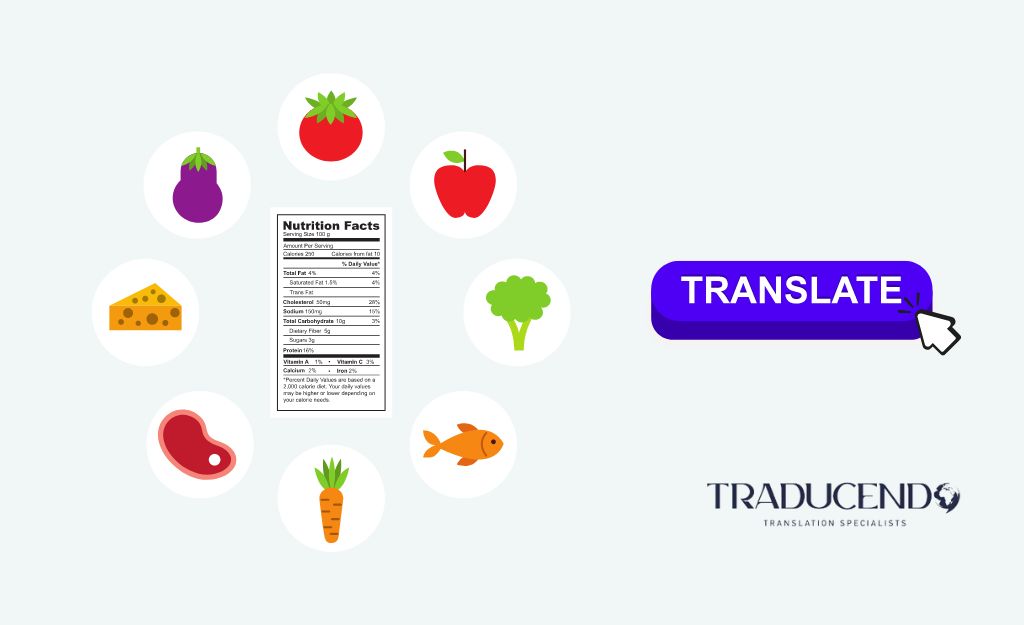This website uses cookies so that we can provide you with the best user experience possible. Cookie information is stored in your browser and performs functions such as recognising you when you return to our website and helping our team to understand which sections of the website you find most interesting and useful.
Translating nutritional information

The rise in illnesses associated with poor diet and excess weight – which are significant issues in many developed and developing countries – means that more and more people are checking the nutritional information of food products before they buy or consume them.
This trend is especially relevant for companies that operate in the field of nutrition or food product labelling. They need to ensure that content is translated correctly so that nutritional values and dietary guidelines are communicated accurately.
Therefore, when translating nutritional information, these companies need to have an excellent grasp of the relevant technical terminology and be familiar with the regulations governing how labels are presented.
In this article, we will share some tips to help food companies understand the importance of accurately translating nutritional content.
Knowledge of the fundamental concepts of nutrition
Before you start work on translating nutritional content, you need to have a firm grasp of the basic concepts of nutrition.
That’s why it’s important to familiarise yourself with the terminology used to describe food groups, nutritional values and dietary guidelines. This will help you to better understand the original content and to accurately communicate it in the target language.
In-depth terminological research
Every language has its own specific terminology related to nutrition. You will need to research the key terms and concepts in the relevant languages to produce an accurate translation.
It’s also a good idea to use reliable sources, such as specialised glossaries and technical dictionaries and documents, to make sure that you are using the correct and most up-to-date terms in your translations.
Consider the cultural differences
Diet and culinary preferences vary from one culture to another. That’s why it’s important to check that all translations are adapted to the food customs and dietary practices of the target audience. You’ll need to take into account local ingredients, units of measurement and food preparation methods.
Keep your translations consistent
It’s important to maintain consistency when translating nutritional content. To achieve this, you’ll need to use the same style and standard terminology throughout the text to prevent confusion.
It’s also useful to create a glossary or list of key terms with their corresponding translations to ensure consistency throughout your documents or food labels. You’ll also need to follow the guidelines set out by the client to ensure that all translations are standardised.
Know your local regulations
When translating nutritional content, it’s vital that you take into account the local regulations in the destination country. Every country has its own requirements in terms of food labelling, nutritional claims and properties.
Therefore, it’s important to carry out in-depth research to understand the applicable regulations and to make sure that the translations are accurate and comply with legal requirements.
Consult translators that specialise in nutrition
Sometimes it makes sense to get support from translators that specialise in nutrition.
These professionals have in-depth knowledge of the technical terminology and concepts specific to nutrition, which helps them to produce high-quality, accurate translations in multiple languages. With their experience and expertise, you’re guaranteed a reliable translation that’s suitable for the nutrition sector.
Translating ingredients on product labels
If you’re selling food products on the international market, it is vital that you check that the product labels are translated accurately.
One of the most important parts of this process is the translation of ingredients. Consumers need to know what is in a product so that they can take an informed decision about whether or not to consume it.
That’s why businesses that specialise in nutrition need to check that ingredients are translated correctly and that there are no mistakes. To do this, they need to know the correct terminology to use and understand the local food labelling regulations.
Some ingredients can have multiple names in different languages, which is why it’s so important to use the terms that are recognised and accepted for use in the destination country.
In some cases, additional information – such as allergens or additives – needs to be provided in the various target languages to ensure the safety and transparency of information intended for consumers.
Translating branding content for food products
In addition to product labels, the branding content for food products also needs to be translated correctly. This content includes the product names, descriptions and marketing slogans and any promotional information relating to the products.
Product branding is an integral part of the marketing strategy for a product and plays a decisive role in persuading and attracting new customers. When translating this kind of content, the message and intention of the original content must be conveyed effectively in the target language.
Language use and culture vary from country to country, so nutrition and health companies also need to adapt their branding content to make sure that it’s relevant to the intended audience, taking into account the preferences and cultural values of local consumers.
In short, translating nutritional content for companies in this sector requires careful focus and a solid understanding of both nutrition and cultural differences to ensure that the end consumers fully understand what they are consuming.
So, if your company is in the nutrition or food products sector and you want to ensure that your translations are consistent and accurately convey the message of the original content, Traducendo is the agency for you.
We specialise in providing high-quality translations of nutritional content. Our team of translators have in-depth knowledge of and extensive experience in the area of nutrition, which means that we can produce clear and straightforward translations for this sector. Get in touch today – we’d love to tell you more!

